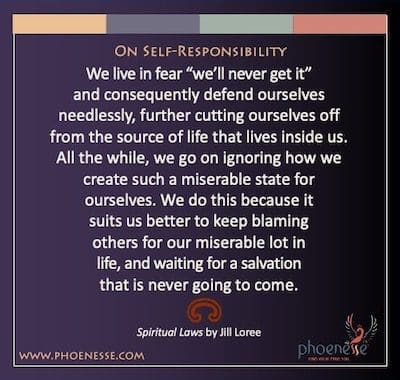The Law of Self-Responsibility puts the onus on us to resolve our own problems, whatever they may be. It takes away the belief that somehow we have been defeated—by our childhood, by other people, or by life. It also wipes away any remaining childish notion that for us to be happy, we must be king of the hill. For the illusion that we’re passive victims is just as unrealistic as the notion that we are omnipotent rulers.

Paradoxically, as soon as we get on with accepting our own limitations and the ways in which our shortcomings contribute to our unsatisfying life experiences, we’ll discover the boost of power we need to transform our lives into something more meaningful. We will also start to see that others also have limitations. And that it’s the interlocking combination of our faults that co-creates our conflicts.
Accepting self-responsibility then is the way to eliminate self-pity and get past resignation. It helps us move beyond endless endurance and unpack smoldering resentments against the injustices of life. It’s also the way to stop harping on the cases we have built against others. For that is a Lower-Self game we play which needs to end.
In contrast, if we refuse self-responsibility, we will stay stuck in being dependent on others. And the byproduct of this is feeling helpless and powerless. This inevitably leads to resentments because it’s not possible for others to fulfill all of our expectations. We will live in fear “we’ll never get it.” Consequently we defend ourselves needlessly. This further cuts us off from the source of life that lives inside us.
All the while, we go on willfully ignoring how we are the ones creating such a miserable state for ourselves. We do this because it suits us better to keep blaming others for our miserable lot in life, and waiting for a salvation that is never going to come.
Speaking of salvation, let’s be clear, Christ did (and does) so incredibly much for us. But it makes no sense for Christ to have died on the cross for the sins of someone else. No, if we have committed a sin—veered away from spiritual laws using our own God-given free will—then we’re the ones who have to make it right. No one else can or should do our work for us.
Next Chapter
Return to Spiritual Laws Contents


